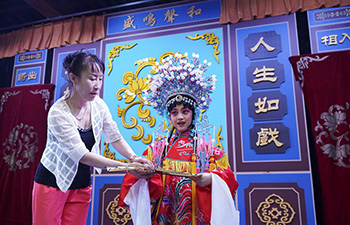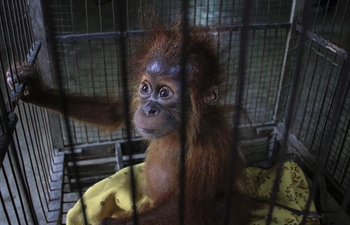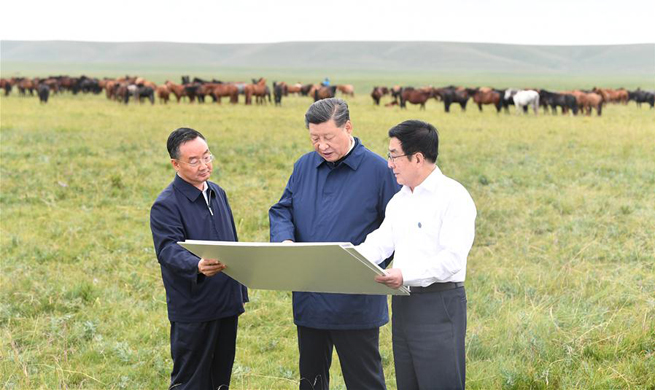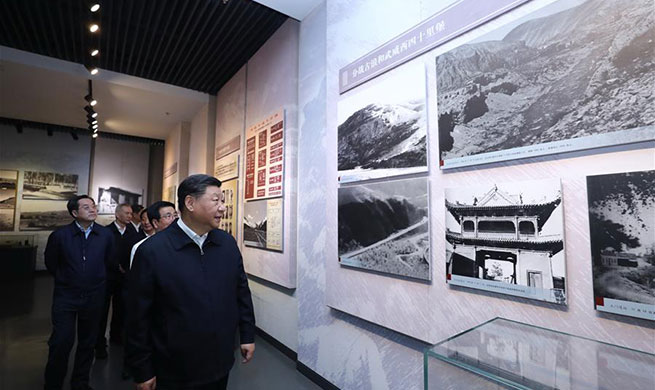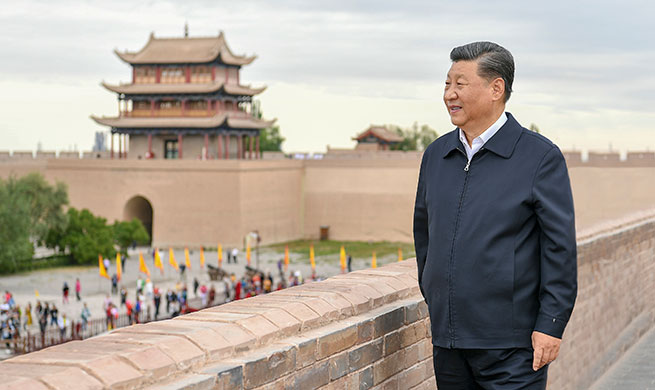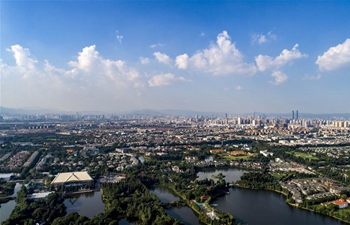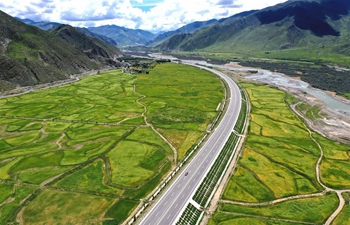LHASA, Aug. 21 (Xinhua) -- Tucked away in a virgin forest on the southeast fringe of the Tibetan plateau bordering Myanmar and India, the Deng people, a tribe of only about 1,600 in China, lived a primitive life just several decades ago.
From slash-and-burn farming and tying knots to keep records, the Deng people only took half a century to find a way out of the mountains and live new, modern lives. It all began from the democratic reform that happened 60 years ago in Tibet.
DISAPPEARING TRIBE
Deng people mainly live in a dozen villages in Zayu County in the Tibet Autonomous Region. They have their own oral language, but no written one. They call themselves Deng, meaning "poor people."
Jinxia, a local village head, joked that Deng people had been leading fashion trends since the 1950s by "wearing sexy furs."
The furs were animal skins from hunting, which were only enough to cover a small fraction of the body, Jinxia explained.
Their homes were built using branches, hay and animal skins; wooden sticks, knives and arrows were their main production tools; wild animals, fruits and herbs were their primary food sources.
Since the democratic reform in 1959, Deng people began to move to valley plains to learn to build homes and grow grains, while abandoning the old lifestyle of hunting and mercenary marriage.
Entering Xia'ni Village, rows of new homes are surrounded by neat paddy fields and kiwi fruit orchards. Xia'ni is home to 174 Deng people from 43 households. At an altitude of 1,665 meters, the village has plenty of rain and abundant subtropical plants.
Homes featuring cement frames, al-alloy windows and security doors, and traditional roofs scatter the village. Huhulong, 25, pointed to an abandoned house where his grandfather once lived.
He said three generations of his family used to live there, which could barely keep the rain out in the summer, and difficult to keep warm in winter.
Gajigu, 54, moved into a 140-square-meter new home last year. The head of the family of five said they only had to pay 9,000 yuan for the house, while the government subsidized 150,000 yuan.
Du Yuanwen, county head of Zayu, said the government's border village development project has brought a large amount of investment to improve the living standard of Deng people.
THRIVING INDUSTRIES
Besides new homes, the local government has customized ways for Deng people to become rich.
Zheng Tiancheng is an agricultural expert who came nine years ago from the neighboring Sichuan Province. He said this area is a perfect base for growing kiwi fruit thanks to its large temperature difference between day and night, abundant sunlight, pleasant climate and fertile land.
He invested all his savings into kiwi fruit farming, renting land from Deng people and local villagers, and hiring them to work on the farm. Last year alone, local people received nearly 1.3 million yuan of rent and earned another 1.5 million yuan for their work.
"For thousands of years, we had never eaten anything like kiwi fruit, let alone grown it," said Xiongweilong, a Deng young man. "Zheng kept patiently teaching us how to grow it. I have basically mastered the technique after three years."
Xiongweilong tried a small scale farm on his own land in 2015 and made 26,000 yuan his first year. Two years later, he introduced a new breed and expanded the growing scale fivefold.
"This year, the expected income will top 60,000 yuan," he said.
Pigs are another special source of income for Deng people. Nicknamed "Deng delicious pigs," they are a hybrid variety of Tibetan pigs and wild boars.
Apang, head of Jingdu Village, said their pigs are raised freely in the mountains, only to come back to the village to have a meal of cornflour once a day.
Poor households are given free corn seeds, hired to work in pig farms and the meat products factory. As the county government poured half a million yuan into the industry this year, the breeding scale is expected to reach 1,000 pigs soon, generating more jobs and higher incomes.
According to the local government, Deng people bid farewell to absolute poverty, with per capita cash income reaching 11,499 yuan (about 1,630 U.S. dollars) in 2018.
"With a field of 0.67 hectares, an orchard of 2 hectares, and 30 pigs, my family had saved about 120,000 yuan last year," said Zhendeqing in front of his villa-style home in Xiani Village.
CONNECTING TO THE WORLD
Wearing fashionable jeans, a white T-shirt and a pair of Converse, 22-year-old Dihua helps her parents with farm work during summer vacation. As the second teacher in her village, her father is quite proud of her.
Dihua has been working in a county kindergarten in Nyingchi for two years after graduating from a teacher's college in Lhasa.
"My family used to be very poor. My parents struggled to raise my two younger brothers and me. But they lived frugally to send me to school, for that I'm grateful," she said.
She sends money home every month and bears the responsibility of supporting her brothers. Last year, the family moved into a new home, and her parents opened a grocery shop in one of the rooms, using Dihua's money to purchase the first batch of goods.
"Now, everyone in my family has their own bedroom, and the sanitary conditions have improved," she said.
Like Dihua, more and more Deng people have chosen to work and study in cities, leading a different life.
Ameiying, 34, is fourth among her sisters and brothers in her family. She almost dropped out of school due to poverty, but she persisted.
After university, she became a civil servant in a village not far from home.
She said her two younger brothers' studies are her priority. "They are smarter than me and deserve more options in life."
Meizhigao, a local primary school teacher, said the drop-out rate among Deng children is almost zero in recent years, "thanks to the favorable education policies for ethnic minorities, and the tremendous change of concept among Deng people."




